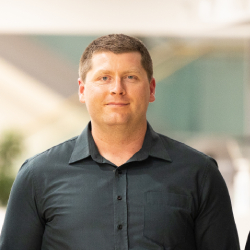
Kris Kramer-Walter
Kris says his studies have given him the knowledge and skills required to excel in biology research, as well as strengthening his ability to self-direct his learning in all aspects of life.
University of Waikato 3MT Doctoral Competition Prize - People's Choice

Qualification(s)
Scholarship(s)
Non-structural carbohydrate availability during flower development influences fruit development in Kiwifruit
Research duration:
2019—2023 (4 year/s)
Two broken arms at the same time didn’t stop Kris Kramer-Walter from completing his Master of Science (Research) degree at the University of Waikato, and now he’s back fully fit and studying for his PhD in Biological Sciences.
He broke his arms in a mountain bike crash in September 2014, and family, friends and his partner Cat had to be his hands for 12 weeks while he recovered, and that included helping him with his research in the lab.
With two good working arms, Kris’s PhD research sees him homing in on kiwifruit.
Conveniently, he works part time as a research associate for Plant and Food Research in Te Puke, the nation’s kiwifruit capital, and his first PhD research objective was to identify drivers of variability in fruit quality within kiwifruit vines.
“I’ve identified the timing of flower opening, and the vigour of the parent shoot as the two key drivers,” he says. “These can both be influenced by the size and availability of local carbohydrate reserves, and so my subsequent research has focused on improving our understanding of carbohydrate storage and release dynamics, and whether this carbohydrate pool can be artificially enhanced using exogenous sugar.”
Before he started his thesis, Kris had been working for Plant and Food on kiwifruit vine physiology. It often involved commercial work for Zespri, who want to reduce variability in fruit quality, and so his thesis topic evolved naturally from this work.
Kris, from Tauranga, moved to Hamilton in 2005 to study for his Bachelor of Science at the University of Waikato and it was that early study that gave him a deep curiosity for plant ecology and physiology.
He spent a few years working for Wildlands ecological consultants, AgResearch, and the Waikato Regional Council, before starting his MSc at Waikato investigating the relationships between root traits of native tree seedlings and their occurrence along soil fertility gradients. He was hired by Plant and Food Research in 2016 and in 2019 was given the opportunity to study for a PhD part time.
He thinks the main requirement for someone considering postgraduate research is a passion for their subject.
“This passion will drive you through the hardest parts of your study, and will give you immense joy and satisfaction when you’re eventually analysing your very own datasets.”
In addition, he is grateful to the lecturers and supervisors who have worked with him over the years, including Associate Professor Mike Clearwater, Associate Professor Daniel Laughlin, Professor Bruce Clarkson, and Chrissen Gemmill.
“They were all exceptional role models, and I’m grateful to them all for sharing their passion for their chosen areas of expertise. They gave me great feedback on my written work, and also fostered my presentation and public speaking skills.”
Those speaking skills came to the fore recently when Kris won the People’s Choice Award and $500 at the recent University of Waikato 3MT (three-minute thesis) competition.
“My studies have given me the knowledge and skills required to excel in biology research, as well as strengthening my ability to self-direct my learning in all aspects of life,” he says.

Qualification(s)
Scholarship(s)
